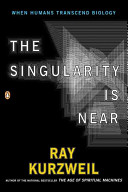

Ray Kurzweil posits that the rate of technological progress is accelerating exponentially. This idea is based on the observation that technological advancements build upon previous innovations at an increasing pace. For instance, the improvements in computing power, as described by Moore's Law, have led to more sophisticated algorithms and applications. Kurzweil argues that this acceleration is not limited to computing but extends to biology, nanotechnology, and artificial intelligence. As we approach the singularity, the fusion of these technologies will lead to unprecedented changes in society, economy, and human life. Understanding this acceleration is crucial for preparing for future challenges and opportunities.
Continue readingKurzweil introduces the Law of Accelerating Returns, which asserts that the rate of technological progress is itself accelerating. This law suggests that each new generation of technology improves upon the previous generation at a faster rate. For example, the development of the internet and mobile technologies has transformed communication, commerce, and entertainment. Kurzweil uses this framework to predict that the next few decades will bring about significant advancements in artificial intelligence, biotechnology, and nanotechnology, leading to a point where machines surpass human intelligence. This idea challenges conventional views of progress and calls for a reevaluation of how we approach innovation.
Continue readingA central theme in Kurzweil's vision is the merging of humans and machines, often referred to as 'transhumanism.' He argues that as technology advances, humans will increasingly integrate with machines, enhancing physical and cognitive abilities. This could involve brain-computer interfaces, genetic modifications, and other technologies that allow humans to transcend biological limitations. Kurzweil believes that this merging will lead to a new era of human evolution, where individuals can choose to augment their capabilities. While this presents exciting possibilities, it also raises ethical questions about identity, privacy, and inequality that society must address.
Continue readingKurzweil predicts that artificial intelligence will reach a point known as the singularity, where machines will surpass human intelligence. This event will not only change the landscape of technology but also redefine what it means to be human. He argues that once machines can improve their own designs and capabilities, the pace of change will accelerate beyond our current understanding. Kurzweil emphasizes the importance of developing ethical frameworks and guidelines for AI to ensure that its evolution benefits humanity. This idea challenges readers to consider the implications of creating superintelligent machines and the responsibilities that come with such advancements.
Continue readingBiotechnology plays a crucial role in Kurzweil's vision of the future. He discusses how advances in genetic engineering, synthetic biology, and nanotechnology will enable us to manipulate biological systems for our benefit. This could lead to breakthroughs in medicine, agriculture, and environmental sustainability. For example, Kurzweil envisions a future where diseases are eradicated through genetic modifications, and food production is optimized using biotechnological innovations. However, he also acknowledges the ethical dilemmas posed by such capabilities, urging a careful examination of the potential consequences of manipulating life at a fundamental level.
Continue readingKurzweil explores the implications of rapid technological advancements on the workforce and society. He predicts that many jobs will be automated, leading to significant changes in how we work and live. While this may initially cause disruption, Kurzweil believes that new opportunities will emerge as technology creates new industries and roles. He advocates for a shift in education and training to prepare individuals for a future where creativity and emotional intelligence are paramount. This idea encourages readers to think critically about the future of work and the skills needed to thrive in an increasingly automated world.
Continue readingThroughout the book, Kurzweil emphasizes the need to address the ethical and philosophical implications of the singularity. He encourages a proactive approach to ensure that technological advancements align with human values and contribute to the greater good. This includes considering issues such as privacy, security, and the potential for inequality in access to technology. Kurzweil argues that engaging in these discussions is essential for shaping a future where technology enhances human life rather than diminishes it. This idea serves as a call to action for readers to participate in the dialogue surrounding the future of technology and its impact on society.
Continue readingThe reading time for The Singularity is Near depends on the reader's pace. However, this concise book summary covers the 7 key ideas from The Singularity is Near, allowing you to quickly understand the main concepts, insights, and practical applications in around 24 min.
The Singularity is Near is definitely worth reading. The book covers essential topics including Technological Acceleration, The Law of Accelerating Returns, The Merging of Humans and Machines, providing practical insights and actionable advice. Whether you read the full book or our concise summary, The Singularity is Near delivers valuable knowledge that can help you improve your understanding and apply these concepts in your personal or professional life.
The Singularity is Near was written by Ray Kurzweil.
If you enjoyed The Singularity is Near by Ray Kurzweil and want to explore similar topics or deepen your understanding, we highly recommend these related book summaries:
These books cover related themes, complementary concepts, and will help you build upon the knowledge gained from The Singularity is Near. Each of these summaries provides concise insights that can further enhance your understanding and practical application of the ideas presented in The Singularity is Near.